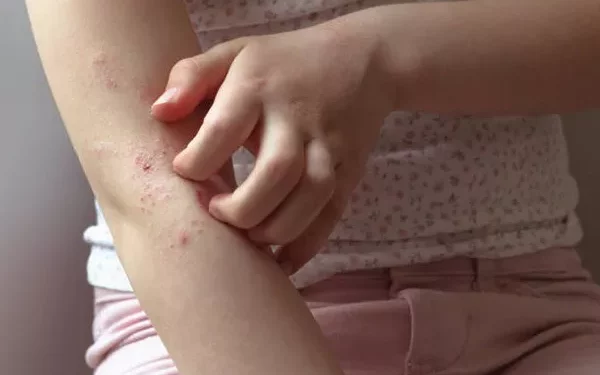Eczema, a common skin condition that causes inflammation, itching, and redness, can sometimes become infected. When eczema gets infected, it can cause additional symptoms like pain, swelling, and discharge. Knowing how to properly treat infected eczema is essential to prevent further complications and promote healing. This guide will walk you through the symptoms, causes, and treatment options for infected eczema.
What is Infected Eczema?
Eczema, also known as atopic dermatitis, is a condition that leads to red, itchy, inflamed skin. While eczema itself is not contagious, the constant scratching and irritation of the affected areas can break the skin, creating an entry point for bacteria, viruses, or fungi. When these microbes invade the skin, it can lead to an infection, making eczema more difficult to treat. Infected eczema typically presents with the following symptoms: increased redness or swelling, pus-filled blisters or bumps, thickened skin or scabbing, yellow or green discharge from the affected areas, pain or tenderness in the infected area, and fever (in some severe cases).
Causes of Infected Eczema
The main cause of infection in eczema is the breaking of the skin barrier. The skin’s protective barrier becomes compromised due to scratching or rubbing, which can introduce harmful bacteria into the deeper layers of the skin. The most common bacteria responsible for infecting eczema are:
Staphylococcus aureus (staph bacteria) – This is the most common bacterium that causes skin infections in people with eczema.
Group A Streptococcus (strep bacteria) – This can cause a more serious infection, known as cellulitis, in some cases.
Fungi – Fungal infections, such as ringworm, can sometimes occur when the skin is damaged by eczema.
How to Prevent Eczema from Getting Infected
Prevention is key when it comes to managing eczema and avoiding infections. Here are some steps you can take to minimize the risk of infection:
Moisturize Regularly: Keeping your skin hydrated is one of the most important steps in managing eczema. Dry skin is more prone to cracking and breaking, which makes it easier for bacteria to enter. Use a fragrance-free moisturizer several times a day, especially after bathing, to lock in moisture.
Avoid Scratching: Scratching can break the skin, creating an opportunity for infection. While it may be difficult, try to resist the urge to scratch. You can use anti-itch creams or medications to help reduce the urge to scratch.
Keep Skin Clean: Wash affected areas gently with lukewarm water and mild, fragrance-free soap. Avoid using harsh soaps or scrubbing the skin, as this can irritate it further. Pat the skin dry with a soft towel instead of rubbing it.
Wear Soft, Breathable Fabrics: Wear loose, soft clothing made from natural fibers like cotton. Avoid wearing wool or synthetic fabrics that can irritate the skin and worsen eczema.
Use Antibacterial Treatments (When Recommended): For some people with eczema, using an antibacterial lotion or cream (such as those containing silver or honey) can help prevent infections, especially in areas prone to cuts or breaks in the skin.
Recognizing an Infected Eczema Flare-Up
If your eczema begins to look more irritated than usual or shows signs of infection, it is important to act quickly. Here are the signs that your eczema may be infected: increased redness and warmth around the affected area, pus-filled blisters or crusting, a foul smell coming from the eczema, pain or tenderness when touching the affected area, fever or chills (in severe infections), and lymph node swelling in nearby areas. If you notice any of these symptoms, you should seek medical attention promptly.
Treatment for Infected Eczema
If you suspect your eczema is infected, there are several treatment options to help you manage the infection. Treatment typically involves a combination of topical and oral therapies, as well as good skincare practices.
Topical Antibiotics
If the infection is mild and localized, your doctor may recommend a topical antibiotic ointment or cream. The most commonly prescribed antibiotics for infected eczema are:
Mupirocin (Bactroban) – This is effective against staph infections and is often used to treat minor skin infections.
Fusidic acid – This antibiotic is often used for skin infections caused by staph bacteria.
These creams or ointments are applied directly to the affected area and are typically used for 7 to 10 days.
Oral Antibiotics
For more widespread or severe infections, or if the infection does not respond to topical antibiotics, your doctor may prescribe oral antibiotics. The most common oral antibiotics for treating infected eczema are:
Cephalexin (Keflex) – A broad-spectrum antibiotic used to treat skin infections caused by both staph and strep bacteria.
Clindamycin – This antibiotic is used when staph bacteria are resistant to other antibiotics.
Oral antibiotics are typically prescribed for 7 to 14 days, depending on the severity of the infection.
Steroid Creams
In some cases, topical corticosteroids may still be used to treat eczema, even if there is a mild infection. These creams help to reduce inflammation and itching. However, if the infection is severe, your doctor may opt for non-steroidal treatments to avoid complicating the infection. If steroids are used, they are typically applied after the infection is under control and only in small doses.
Antifungal Creams (if Fungal Infection is Present)
If your eczema is complicated by a fungal infection (e.g., ringworm or candida), your doctor may prescribe an antifungal cream. Common antifungal treatments include:
- Clotrimazole (Lotrimin)
- Ketoconazole (Nizoral)
- Terbinafine (Lamisil)
These creams can be applied to the affected areas to fight off the fungus.
Wet Dressings
For severe cases of infected eczema, wet dressings can help soothe the skin and promote healing. This method involves applying a wet cloth or bandage to the affected area after applying a topical treatment. The moisture helps keep the skin hydrated and can also assist in delivering medication directly to the site of infection.
Systemic Medications (For Severe Infections)
In some rare cases, when eczema becomes severely infected, your doctor may recommend systemic medications, such as oral antivirals (for viral infections like herpes simplex) or oral antifungals. For very severe bacterial infections, intravenous antibiotics may be required, especially if the infection has spread.
Home Remedies for Infected Eczema
While medical treatments are essential for treating infected eczema, there are also several home remedies that can help manage symptoms and support recovery:
Epsom Salt Baths: An Epsom salt bath can help soothe irritated skin and reduce inflammation. Add 1-2 cups of Epsom salt to a lukewarm bath and soak for 15-20 minutes. Pat the skin dry afterward, and apply a moisturizer.
Aloe Vera: Aloe vera has natural anti-inflammatory and antibacterial properties. Applying aloe vera gel to the affected areas can help soothe the skin, reduce redness, and promote healing.
Honey: Honey, especially manuka honey, has antimicrobial properties and can be applied to the skin to help fight off bacteria. It also helps to moisturize and heal damaged skin.
Coconut Oil: Coconut oil has natural moisturizing and antibacterial properties. Applying virgin coconut oil to the skin can help keep it hydrated while also preventing infections from worsening.
Tea Tree Oil (Diluted): Tea tree oil is known for its antibacterial properties. However, it should always be diluted with a carrier oil (such as coconut oil) before being applied to the skin, as it can be irritating when used undiluted.
When to See a Doctor
While some minor infections can be treated at home, it’s important to seek medical attention if:
- You notice worsening symptoms, such as increased redness, swelling, or pus
- You develop a fever or feel generally unwell
- The infection is spreading rapidly
- Over-the-counter treatments aren’t effective
Infected eczema can be a serious condition, and prompt treatment is crucial to prevent complications. If you are unsure about the severity of the infection, it’s always best to consult with a healthcare provider.
Conclusion
Treating infected eczema requires a combination of good skincare practices, topical treatments, and sometimes antibiotics or antifungals, depending on the nature of the infection. Early intervention is essential for preventing the infection from spreading and becoming more severe. By following the recommendations in this guide, you can manage your eczema infection more effectively and promote healing. Always consult with your healthcare provider to determine the best course of treatment for your individual situation.
Related topics:


























